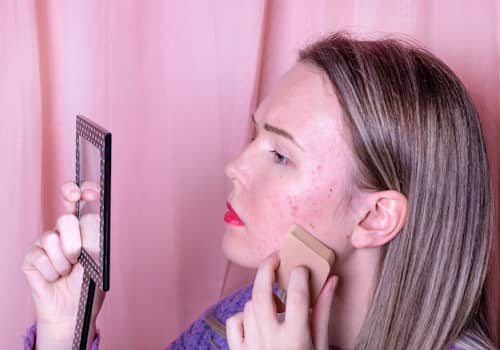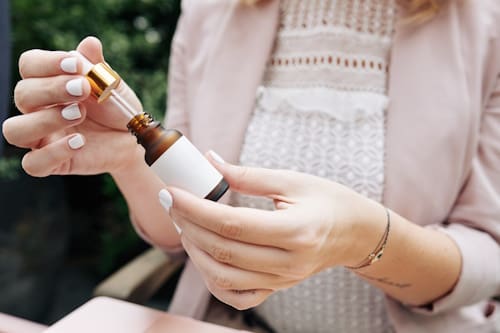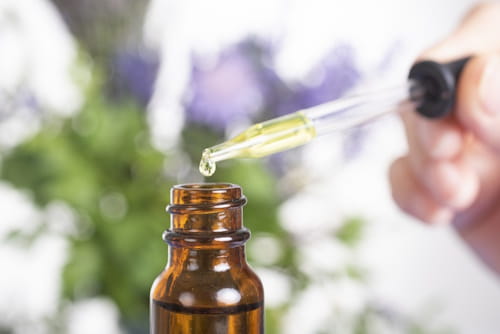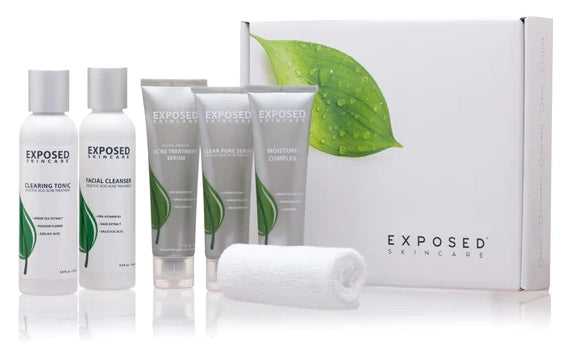
Acne is one of the most widespread skin conditions affecting people of all ages and skin types. It’s frustrating when acne still finds its way to your skin despite following a religious skincare routine. Worse, some commonly found ingredients in your skincare products can cause acne.
Some ingredients are notorious for clogging pores, leading to acne-prone skin. This guide will unveil seven common ingredients that cause acne. We’ll dive deep into each ingredient, explaining how they contribute to acne breakouts and what alternatives you should consider.
Biggest Take-Aways:
- Many skincare and cosmetic products contain comedogenic ingredients that can worsen acne.
- Transparency in ingredient lists is crucial for making informed choices, especially when dealing with acne-prone skin.
- Not all skincare companies are honest in their marketing; you must do your own research to avoid clogging ingredients.
- Exposed Skin Care stands out for its non-comedogenic, transparently formulated products that treat acne and promote clear skin.

Hormonal Acne and Its Triggers
Before we delve into the ingredients that cause acne, let’s briefly touch on hormonal acne. Hormonal acne is often triggered by hormone fluctuations, particularly androgens, which can cause the skin to produce excess oil or sebum.
While hormonal acne can be challenging to control, certain ingredients in skin care products can aggravate it further. Knowing what ingredients to avoid can make a significant difference in managing your acne-prone skin effectively.
7 Notorious Ingredients That Cause Acne
Unraveling the ingredient list on skincare products can be like decoding a complex puzzle. But worry not; we’re here to demystify these enigmatic terms for you.
1. Coconut Oil
Why it Causes Acne
Coconut oil has gained considerable attention for its multiple skincare and hair care uses. However, coconut oil is less than ideal when it comes to acne-prone skin. This natural ingredient is highly comedogenic, meaning it can clog pores. The lauric acid in coconut oil can be troublesome for those with acne-prone skin.

Alternatives to Consider
- Jojoba Oil: It closely mimics the skin’s natural oils, making it less likely to clog pores.
- Argan Oil: Known for its non-comedogenic properties, it can be a safer alternative for sensitive skin.
2. Cocoa Butter
Why it Causes Acne
Cocoa butter is often found in moisturizers and lotions. While it can soften skin, its pore-clogging capabilities make it a risky choice for acne-prone skin types.
Alternatives to Consider
- Shea Butter: Unlike cocoa butter, it has lower comedogenic levels.
- Squalane: Derived from olives, it hydrates without clogging pores.
3. Lauric Acid
Why it Causes Acne
Lauric acid is found in coconut oil and many skincare products designed to treat acne. Ironically, it is comedogenic and can exacerbate acne conditions by clogging pores.
Alternatives to Consider
- Salicylic Acid: An excellent acne treatment that helps dissolve dead skin cells and unclog pores.

- Glycolic Acid: Effective for exfoliating and does not clog pores.
4. Sunscreen Ingredients
Why They Cause Acne
Certain chemical sunscreens contain not only comedogenic ingredients but also irritate the skin, leading to inflamed acne.
Alternatives to Consider
- Mineral Sunscreens: Look for zinc oxide or titanium dioxide as active ingredients.
- Sunscreen formulated for sensitive skin: These are often less likely to cause breakouts.
5. Alcohol-Based Products
Why They Cause Acne
Alcohol can strip the skin of its natural oils, causing it to produce more sebum, thus leading to clogged pores and acne.
Alternatives to Consider
- Alcohol-free toners: Opt for natural, hydrating ingredients like rose water.
- Serums without alcohol: Look for hydrating serums that don’t contain high levels of alcohol.
6. Synthetic Fragrances
Why They Cause Acne
Artificial fragrances can cause inflammation and allergic reactions, manifesting as acne breakouts on sensitive skin.
Alternatives to Consider
- Fragrance-free products: Many skincare brands now offer fragrance-free lines.
- Essential oils: While some can be irritating, many are safe and can offer a natural scent.

7. Sodium Lauryl Sulfate (SLS)
Why it Causes Acne
SLS is a common ingredient in cleansers and shampoos. It can irritate the skin and hair follicles, leading to clogged pores and acne.
Alternatives to Consider
- Sodium Cocoyl Isethionate: A gentle surfactant that cleanses without irritating the skin.
- Decyl Glucoside: Derived from sugar, it is gentle and non-irritating.
Navigating the Skincare Aisle: Tips for Choosing Products
Now that you know the ingredients that cause acne, how do you select the right skincare products? Here are some tips:
- Read the Ingredient List: Always make it a habit to read through the ingredient list. Avoid products that contain high levels of the ingredients mentioned above.
- Understand Your Skin Type: Whether you have dry skin, sensitive skin, or acne-prone skin, choosing products tailored to your skin type is crucial.
- Opt for Non-Comedogenic Labels: These products are designed not to clog pores.
- Test Before You Invest: Before fully committing to a new product, always conduct a patch test to ensure it doesn’t irritate your skin or cause acne breakouts.
Experience Clear Skin with Exposed Skin Care
Navigating the maze of skincare ingredients can be daunting, especially when managing frequent acne breakouts. That’s where Exposed Skin Care comes into play, offering a comprehensive range of skincare products specifically formulated for acne-prone skin.

Here’s how Exposed Skin Care can benefit you:
- Non-Comedogenic Formulas: Unlike many products containing comedogenic ingredients, Exposed Skin Care uses non-comedogenic formulations, ensuring your pores remain unclogged.
- Targeted Acne Treatment: These products are designed to address various acne issues, from blackheads to stubborn white bumps on the skin.
- Carefully Curated Ingredients: The list of ingredients in Exposed Skin Care products is meticulously selected to avoid common acne-causing ingredients. You won’t find any pore-clogging or skin-irritating substances here.
- Multi-Functional Products: Not just limited to acne medications, the line includes skincare and makeup products compatible, providing a holistic approach to acne management.
- Transparency: The company is transparent about what its products contain, making it easier for you to identify ingredients that may cause acne.
- Safety for Skin and Hair: These products are safe to use on your skin and are also compatible with hair care products, which are not found in many cosmetic products.
So, if you suffer from acne and are looking for products that promote clear skin, Exposed Skin Care could be your go-to solution. It’s designed to keep your skin clear without complicating your routine with a long list of pore-clogging ingredients to avoid.
Conclusion
The market is flooded with products that claim to solve your acne woes, but many of these products contain acne-causing ingredients to avoid. Even a single glance at an ingredient list could reveal at least 10 ingredients that are not only ineffective but also contribute to worsening your acne condition.
The key to fighting acne effectively lies in understanding the ingredients in your skincare products. Certain ingredients may seem harmless but could also cause adverse reactions. This makes it crucial to opt for products that are transparent about their ingredients, especially those designed specifically for acne.
These products for acne will not only contain elements to treat active acne but will also help reduce acne in the long run. The safety of products for both skin and hair is another major concern. No one wants to invest in a product that excels in clearing face acne but clogs pores on other body parts.
Look for products that are designed for the face and body and that don’t contain oils known to be comedogenic. It’s important to note that not all skincare companies are honest in their marketing. Some claim their products promote clear skin, but their offerings are far from what they promise.
Exposed Skin Care is a reliable choice amidst a sea of comedogenic products that clog pores and contribute to acne. The brand avoids harmful ingredients and is transparent, making it easier for you to make an informed choice for your skincare needs.